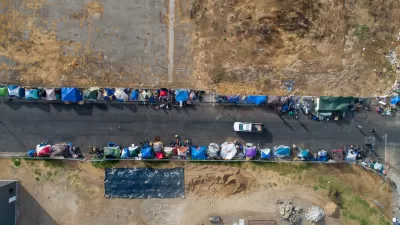Should architects recuse themselves from designing buildings that violate human rights? Raphael Sperry says yes, especially when it comes to two building types that are ethically troublesome: execution chambers and supermax prisons.
Sperry, president of Architects/Designers/Planners for Social Responsibility (ADPSR), pens an opinion piece for The Architect's Newspaper in which he calls for the AIA to amend its Code of Ethics and Professional Conduct to prohibit the design of “buildings that violate human rights.” He bases his call on two specific (and rare) building types: execution chambers and supermax prisons.
"Consider that doctors, nurses, psychologists, anesthesiologists, and many other medical professionals have specifically amended their ethics codes to prohibit participation in executions or any act of torture. The World Medical Association code even states, 'The physician shall not provide any premises, instruments, substances, or knowledge to facilitate the practice of torture.'”
"Does the public expect anything less from architects who 'provide premises' as our basic public service? Does our obligation to protect public 'health, safety, and well-being' not include, as a bare minimum, a commitment to stop making places where—admittedly despised—members of the public will be killed or tortured?"
"What’s at stake here is not just the tiny number of contracts for these building types," Sperry argues, "but architects’ professional commitment to public well-being."
FULL STORY: AIA Must Do More For Human Rights

Alabama: Trump Terminates Settlements for Black Communities Harmed By Raw Sewage
Trump deemed the landmark civil rights agreement “illegal DEI and environmental justice policy.”

Planetizen Federal Action Tracker
A weekly monitor of how Trump’s orders and actions are impacting planners and planning in America.

The 120 Year Old Tiny Home Villages That Sheltered San Francisco’s Earthquake Refugees
More than a century ago, San Francisco mobilized to house thousands of residents displaced by the 1906 earthquake. Could their strategy offer a model for the present?

In Both Crashes and Crime, Public Transportation is Far Safer than Driving
Contrary to popular assumptions, public transportation has far lower crash and crime rates than automobile travel. For safer communities, improve and encourage transit travel.

Report: Zoning Reforms Should Complement Nashville’s Ambitious Transit Plan
Without reform, restrictive zoning codes will limit the impact of the city’s planned transit expansion and could exclude some of the residents who depend on transit the most.

Judge Orders Release of Frozen IRA, IIJA Funding
The decision is a victory for environmental groups who charged that freezing funds for critical infrastructure and disaster response programs caused “real and irreparable harm” to communities.
Urban Design for Planners 1: Software Tools
This six-course series explores essential urban design concepts using open source software and equips planners with the tools they need to participate fully in the urban design process.
Planning for Universal Design
Learn the tools for implementing Universal Design in planning regulations.
Clanton & Associates, Inc.
Jessamine County Fiscal Court
Institute for Housing and Urban Development Studies (IHS)
City of Grandview
Harvard GSD Executive Education
Toledo-Lucas County Plan Commissions
Salt Lake City
NYU Wagner Graduate School of Public Service





























